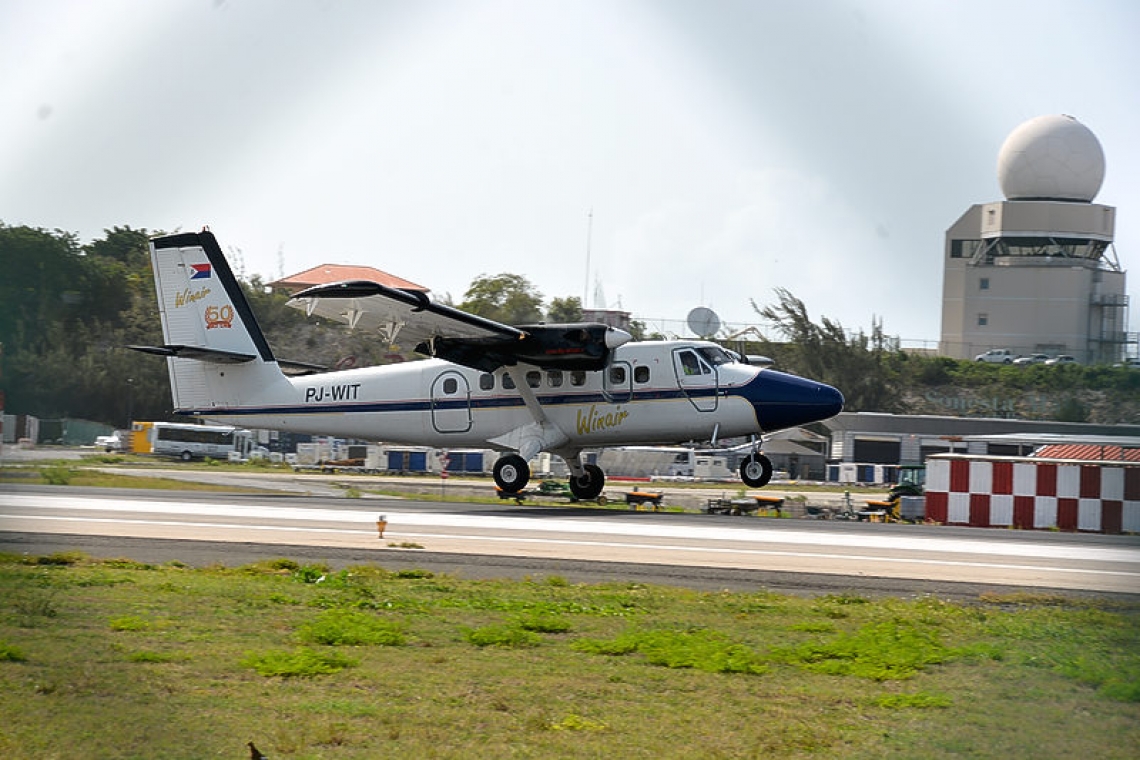PHILIPSBURG--Government-owned companies Princess Juliana International Airport (PJIA), Port St. Maarten and Winair are set to receive payroll support for their staff as part of the St. Maarten Stimulus Relief Plan (SSRP), which goes into effect this month.
These companies are set to receive assistance because their income is expected to be drastically affected as a result of the lockdown due to the current coronavirus COVID-19 crisis.
Government-owned utilities companies GEBE and TelEm are not expected to be as severely affected and have not been identified to receive support.
The SSRP states, the airport operating company PJIAE was expected recover its business to an estimated level of 85 per cent this year and start its reconstruction programme after the devastation of the 2017 hurricanes. However, this is being delayed due to the COVID-19 pandemic.
PJIA prepared a crisis programme which includes drastic trimming of cost and bridging the crisis period (zero business) with available reserves and funds. The company has approximately 270 employees with a payroll cost of NAf. 2.3 million per month. As of mid-March, the airport’s revenues were expected to have been completely depleted whilst the majority of the operational expenses were expected to continue.
PJIA’s management, in consultation with their stakeholders and financiers, intends to continue with the reconstruction project so that when the health crisis is over and travellers start flying again, the airport is able to facilitate this. To make this possible, the airport needs support with its monthly payroll and has therefore been included in the calculations for SSRP’s payroll support programme for businesses, the SSRP outlined.
As it relates to Port St. Maarten, cruise-related revenues will drop dramatically, as no cruise ships are expected for the coming period. Although the Port has some agreements with cruise lines regarding minimal revenues, this will not directly generate cash.
Cargo revenue will continue. However, due to less tourism-related activity, this will decrease. An initial economic impact assessment in March shows that the Port has sufficient cash to continue its critical investments and keep the port operational, but requires support for the monthly payroll, which is NAf. 1,105,200 (US $614,000) per month. The Port has therefore been included in the calculations for the payroll programme.
Winair is currently not operating due to flight restrictions imposed by government and internationally. A stress test conducted in March on the airline’s liquidity position shows that outstanding receivables are uncollectible at this time, while majority of Winair’s payables are automatically deducted from its bank account.
Based on the highly regulated industry in which it operates, Winair is required to pay the majority of its payables without delay to prevent being labelled as delinquent in the aviation world. To ensure a smooth restart after this pandemic, it is imperative that these expenses remain a priority for Winair.
Based on its cash flow position, the payroll expenses for March and April will deplete all the cash reserves it needs to pay other ongoing expenses. Therefore, Winair has been included in the calculations for the payroll programme.
TelEm, on the other hand, is expected to be less disrupted due to its operational structure and revenue generators. The extent of the impact will range from decreased roaming revenues and there will be issues surrounding collections.
Based on an initial assessment of the company’s cash flow and liquidity position, TelEm can maintain its operational expense until July 2020 without income, as its current cash position is at NAf. 22.5 million. TelEm Group has 137 employees and the monthly payroll expenses amount to NAf. 1.6M per month. The company can maintain its operational expenses until June 2020 without income. It is not forecast that TelEm will see a drastic drop in revenues, thus no financial support is required.
TelEm is expected to make arrangements with its financiers to postpone obligations if required. It has offered relief packages to clients in the form of additional data and postponement of disconnection by a week. In addition, the company is seeking ways to increase bandwidth capacity to customers to accommodate working from home and students being home-schooled. It is also working closely with schools to upgrade their connections, to allow for better remote connections.
GEBE is projected to be less disrupted due to its operational structure, revenue generators and healthy cash reserve. Based on this, the company was able to swiftly offer relief to its consumers by lowering its fuel cost from NAf. 0.23 to NAf. 0.18, a reduction of 30 per cent.
Based on the company’s impact assessment, some challenges and risks on operations were identified. These included drastic increase in fuel prices, timeline of COVID-19 surpassing six months, risk of being impacted by hurricanes and the continued lagging behind in the economy after six months.
GEBE had a cash balance of NAf. 46.5 million as of March 19 and is able to meet its monthly obligations. The company has implemented work-at-home measures and efficient staff scheduling to ensure the safety of its staff. It has also been facilitating online payments and payment arrangements for its customers and has ensured no disconnection will be taking place during this period. At this moment, no further financial support is proposed for GEBE.







